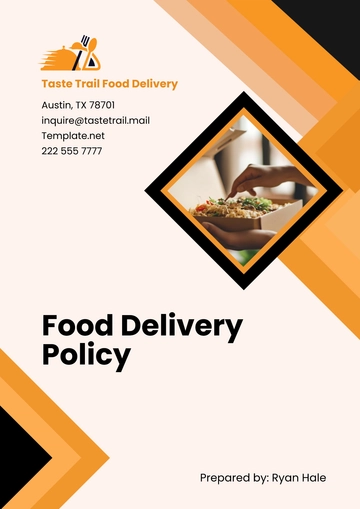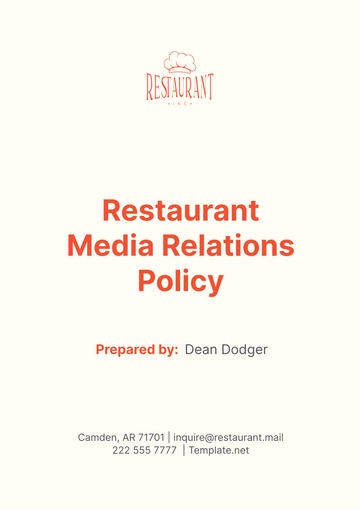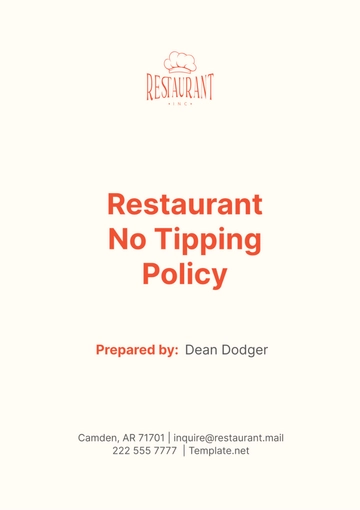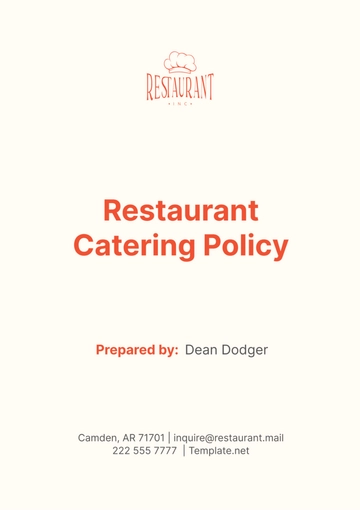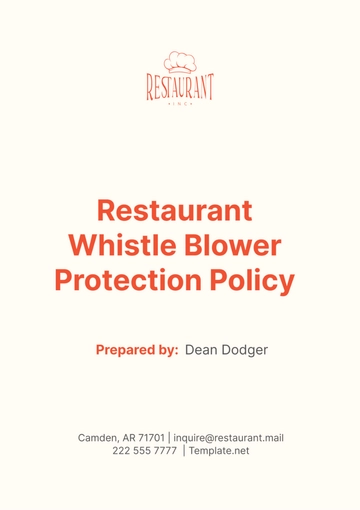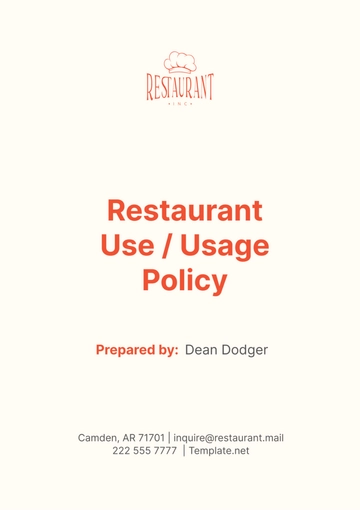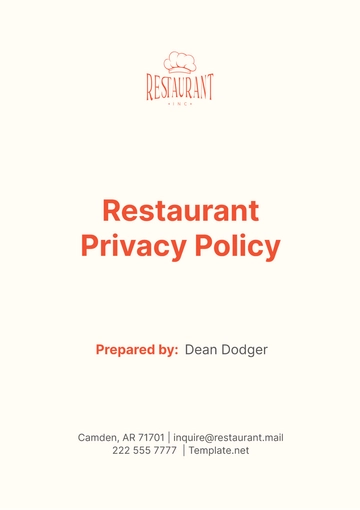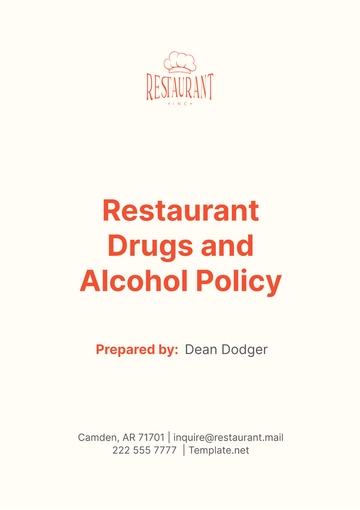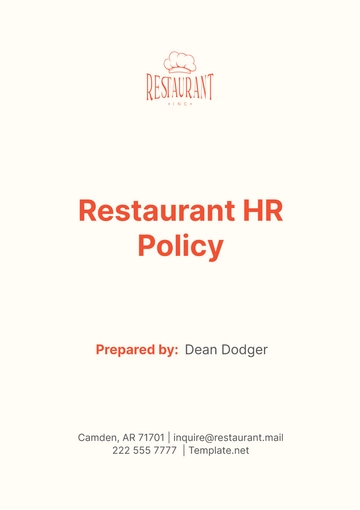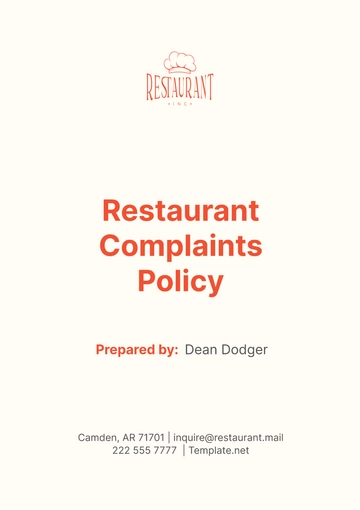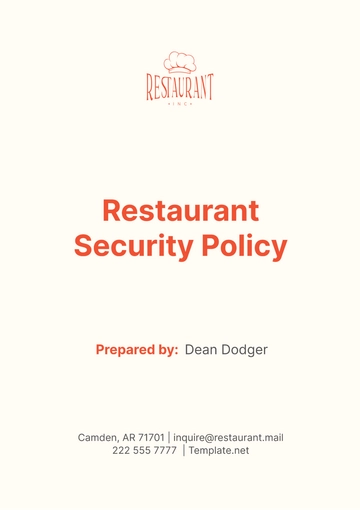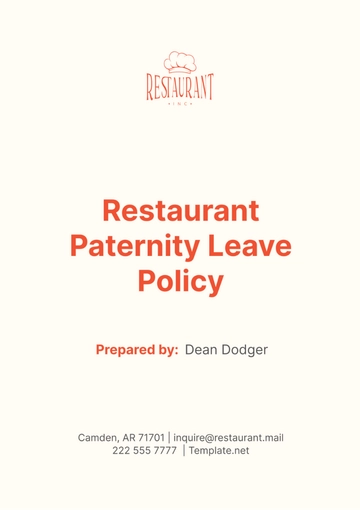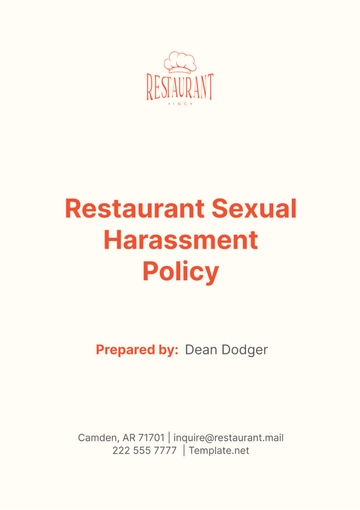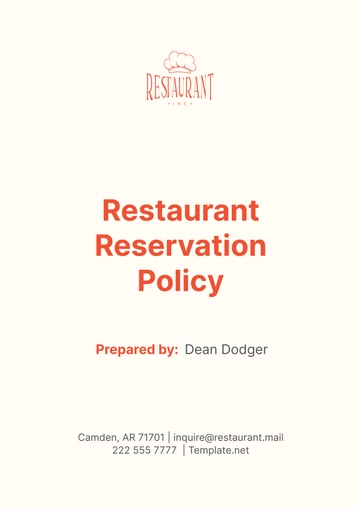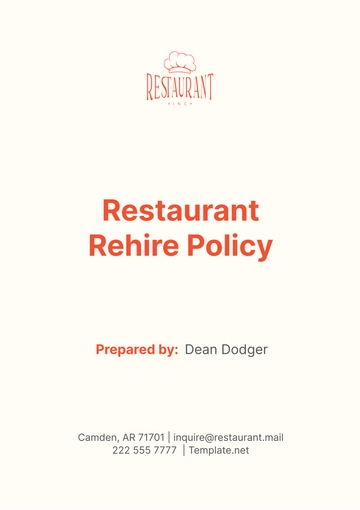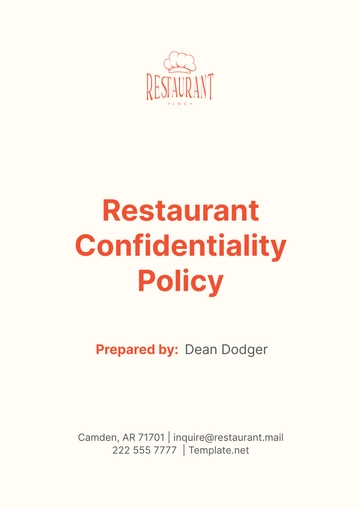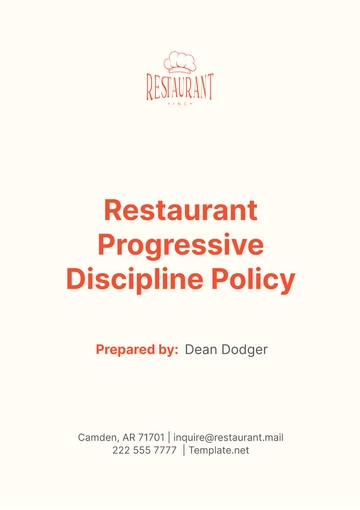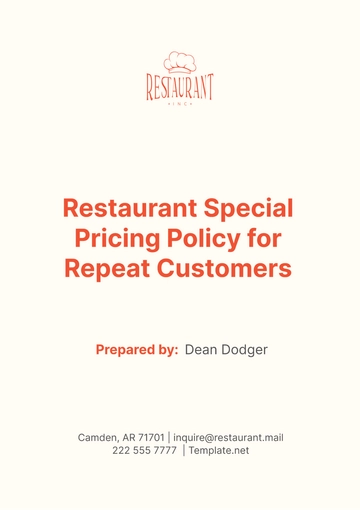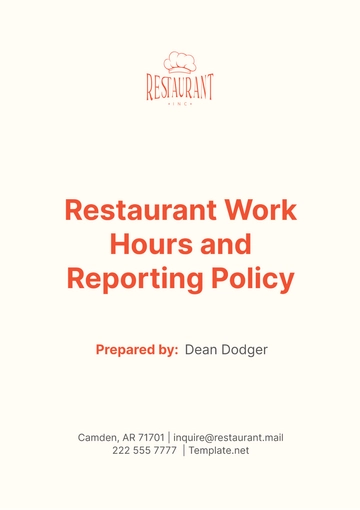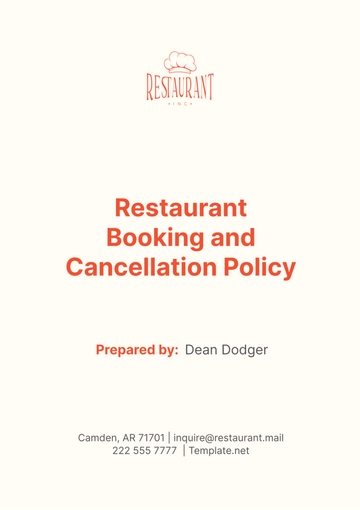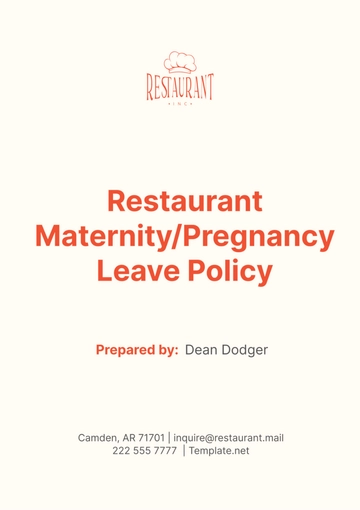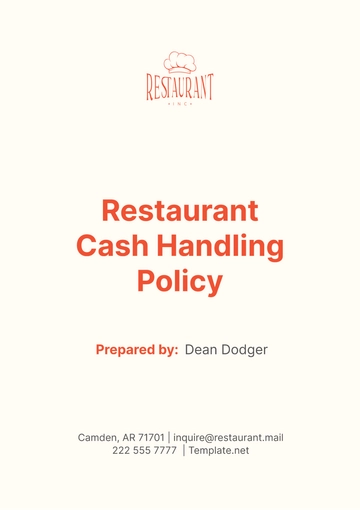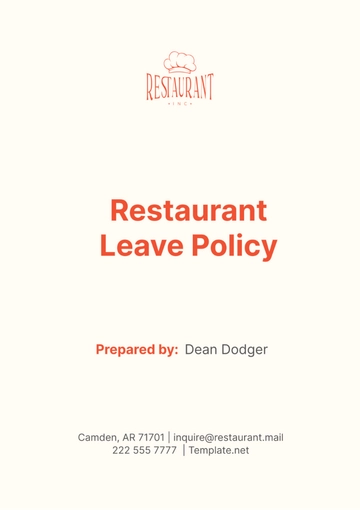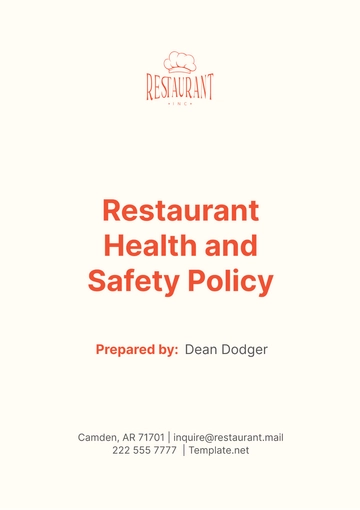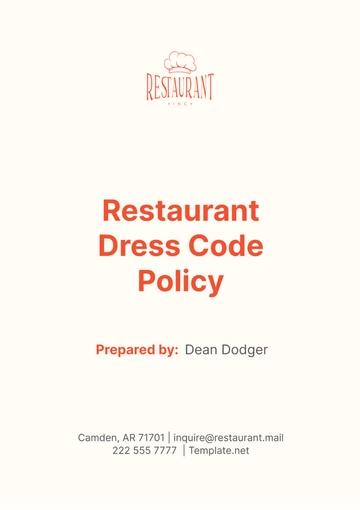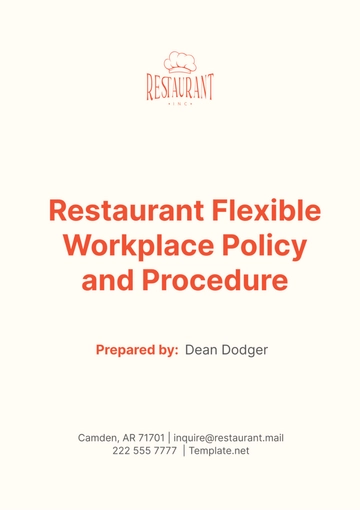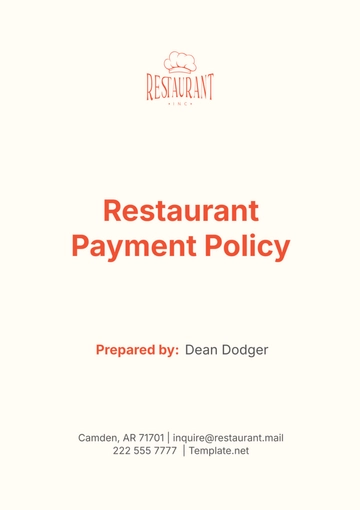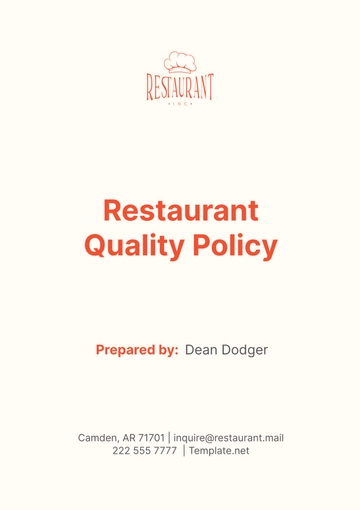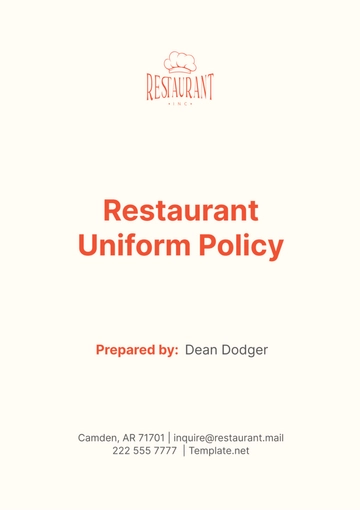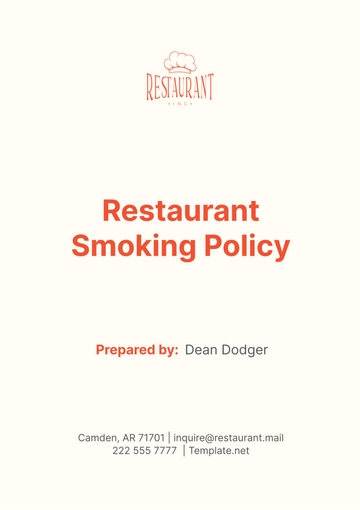Free Restaurant Communication Policy
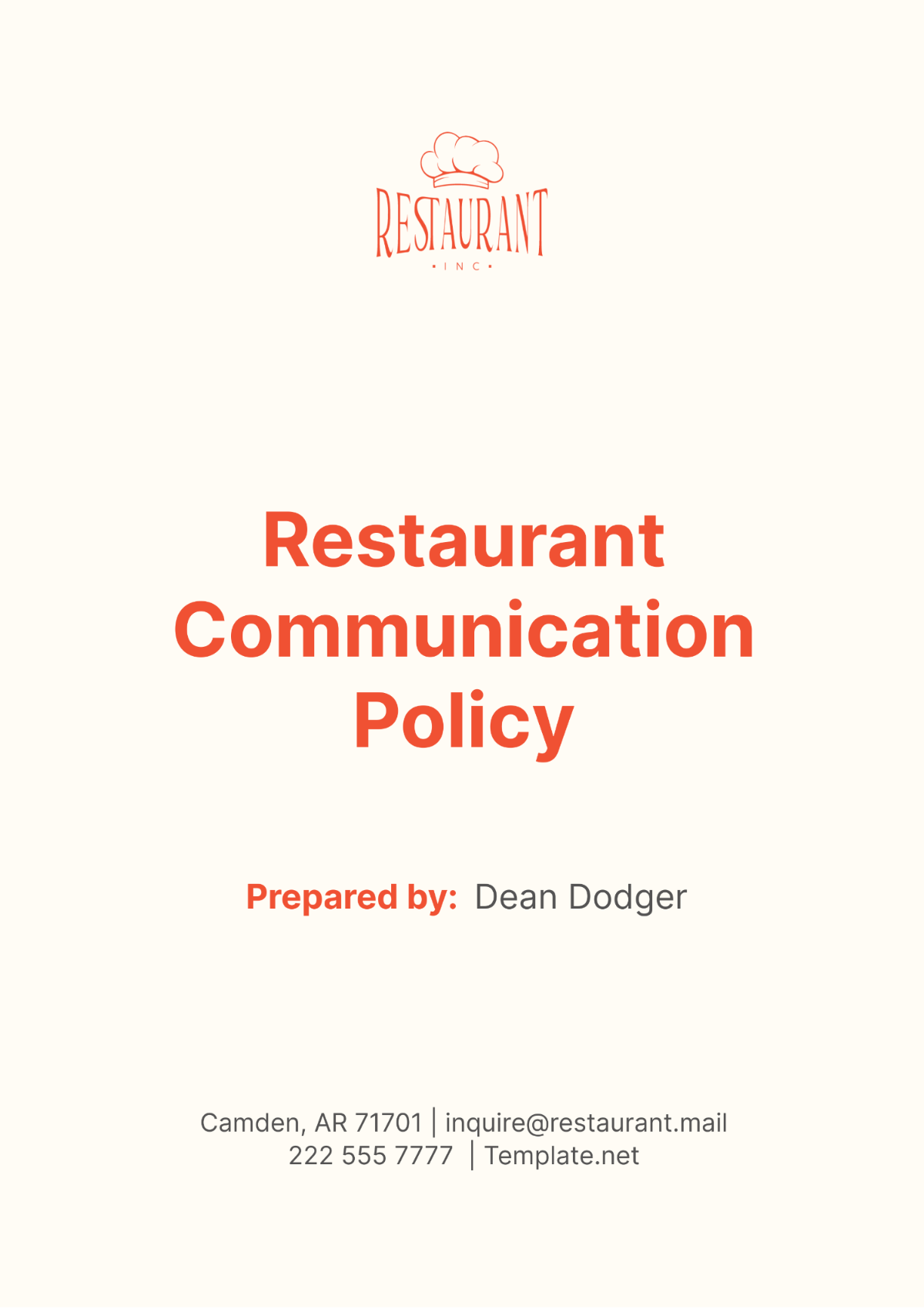
I. Introduction
Effective communication is essential for the smooth operation of our restaurant and the satisfaction of our customers. The purpose of this policy is to establish clear guidelines and procedures for both internal and external communication. This policy applies to all employees and management, ensuring that communication is consistent, professional, and effective across all levels of the organization. Our objectives are to enhance teamwork, improve customer service, and maintain a positive reputation.
II. Internal Communication
A. Staff Meetings
Staff meetings are vital for ensuring that all team members are informed, aligned, and motivated. We will hold weekly staff meetings to discuss operational updates, and upcoming events, and address any concerns. The agenda for each meeting will be prepared in advance and include key topics such as service quality, menu changes, and staff feedback. All staff members are expected to participate, with specific roles assigned for taking minutes and facilitating discussion.
B. Communication Channels
We utilize various communication channels to ensure timely and effective information sharing among staff and management. Each channel has a specific purpose and usage guidelines:
Email: For formal communication, announcements, and detailed information sharing.
Internal Messaging Apps: For quick, informal communication and real-time updates among staff.
Notice Boards: For posting schedules, important notices, and general information in common areas.
Team Meetings: For in-depth discussions, feedback sessions, and collaborative planning.
C. Reporting Procedures
Clear reporting procedures are essential for addressing issues and ensuring continuous improvement. Our reporting procedures include:
Incident Reporting: Staff must report any incidents, such as accidents or customer complaints, immediately to their supervisor.
Feedback and Suggestions: Employees are encouraged to provide feedback and suggestions for improvement through designated suggestion boxes or during staff meetings.
Daily Logs: Supervisors must maintain daily logs of significant events and issues, which are reviewed by management regularly.
D. Confidentiality
Handling sensitive information with care and discretion is crucial for maintaining trust and integrity. All employees are expected to adhere to strict confidentiality protocols:
Sensitive Information: Includes customer data, employee records, and proprietary business information.
Privacy Policies: Staff must follow established privacy policies when accessing, sharing, or storing sensitive information.
Disclosure: Unauthorized disclosure of confidential information is prohibited and may result in disciplinary action.
III. External Communication
A. Customer Interaction
Our goal is to provide exceptional service and create positive experiences for our customers. The following policies guide our customer interactions:
Greeting and Seating Protocols: Staff must greet customers warmly upon arrival and promptly seat them according to their reservations or preferences.
Taking Orders and Service Standards: Staff should take orders accurately, offer menu recommendations, and ensure timely service.
Handling Complaints and Feedback: All customer complaints and feedback must be addressed promptly and courteously. Escalate unresolved issues to a supervisor or manager.
B. Marketing and Promotions
Our marketing and promotional activities aim to attract new customers, retain existing ones, and enhance our brand image. The following policies guide our marketing efforts:
Social Media Guidelines: All social media posts must reflect our brand values and be approved by the marketing team. Engage with customers positively and professionally.
Advertising Standards: All advertisements must be truthful, clear, and comply with relevant regulations. Obtain necessary approvals before publishing.
Public Relations: Maintain positive relationships with community organizations and participate in local events. Ensure all public relations activities align with our brand image.
C. Media Relations
Effective media relations are crucial for managing our public image and responding to inquiries. The following policies guide our interactions with the media:
Designated Spokespersons: Only designated spokespersons are authorized to speak on behalf of the restaurant. Ensure spokespersons are trained and well-informed.
Responding to Media Inquiries: All media inquiries must be directed to the designated spokesperson. Provide accurate and timely information.
Press Releases: All press releases must be approved by management and align with our communication strategy. Distribute press releases through appropriate channels.
IV. Crisis Communication
In the event of a crisis, clear and effective communication is essential to manage the situation and maintain public trust. Our crisis communication policy outlines procedures for handling emergencies and negative publicity.
A. Emergency Procedures
During emergencies, it is crucial to ensure the safety of our staff and customers and communicate effectively. The following procedures guide our emergency response:
Emergency Contact List: Maintain an updated list of emergency contacts, including local authorities and medical services.
Evacuation Plan: Ensure all staff are familiar with the evacuation plan and emergency exits. Conduct regular drills.
Communication During Emergencies: Designate a spokesperson to provide updates to staff, customers, and the public. Use multiple channels (e.g., in-person announcements, social media) to communicate effectively.
B. Handling Negative Publicity
Managing negative publicity requires a strategic approach to protect our reputation. The following procedures guide our response to negative publicity:
Response Strategy: Assess the situation and develop a response strategy in consultation with management and the communications team.
Communication with Stakeholders: Provide timely and accurate information to stakeholders, including staff, customers, and the media. Address concerns transparently and professionally.
Monitoring and Follow-Up: Monitor the situation closely and adjust the response strategy as needed. Follow up with stakeholders to address any ongoing concerns and restore trust.
V. Communication Training
Effective communication skills are essential for maintaining high standards of service and ensuring smooth operations. To achieve this, we provide comprehensive communication training for all staff members. Training sessions are conducted regularly to ensure continuous improvement and adaptation to new communication tools and practices.
Training Program | Frequency | Duration |
|---|---|---|
New Employee Orientation | Monthly | 4 hours |
Customer Service Training | Quarterly | 2 hours |
Crisis Management Workshop | Bi-annually | 3 hours |
Communication Skills Refresh | Annually | 1 day |
Media and Social Media Training | Annually | 2 hours |
VI. Evaluation and Monitoring
Regular evaluation and monitoring of our communication practices are essential to ensure they remain effective and aligned with our objectives. Communication practices will be reviewed bi-annually through staff feedback, customer surveys, and performance metrics. Any identified areas for improvement will be addressed promptly through updates to policies and additional training sessions. Continuous evaluation helps us maintain high standards and adapt to evolving communication needs and technologies.
- 100% Customizable, free editor
- Access 1 Million+ Templates, photo’s & graphics
- Download or share as a template
- Click and replace photos, graphics, text, backgrounds
- Resize, crop, AI write & more
- Access advanced editor
Introducing Template.net's Restaurant Communication Policy Template! This editable solution offers seamless customization, allowing you to tailor communication policies to your restaurant's unique needs. With our AI Editor tool, crafting and modifying policies becomes effortless. Ensure clarity and efficiency in your communication strategies, fostering a cohesive environment for your team and enhancing customer experiences. Streamline operations and elevate your restaurant's communication standards today!
You may also like
- HR Policy
- Restaurant Policy
- Company Policy
- Accounting Policies and Procedures
- Website Policy
- Privacy Policy
- Safety Policy
- School Policy
- IT and Software Policy
- Law Firm Policy
- Construction Policy
- Interior Design Policy
- Travel Agency Policy
- Education Academic Policy
- Security Policy
- Real Estate Policy
- Expense Policy
- Software Policy
